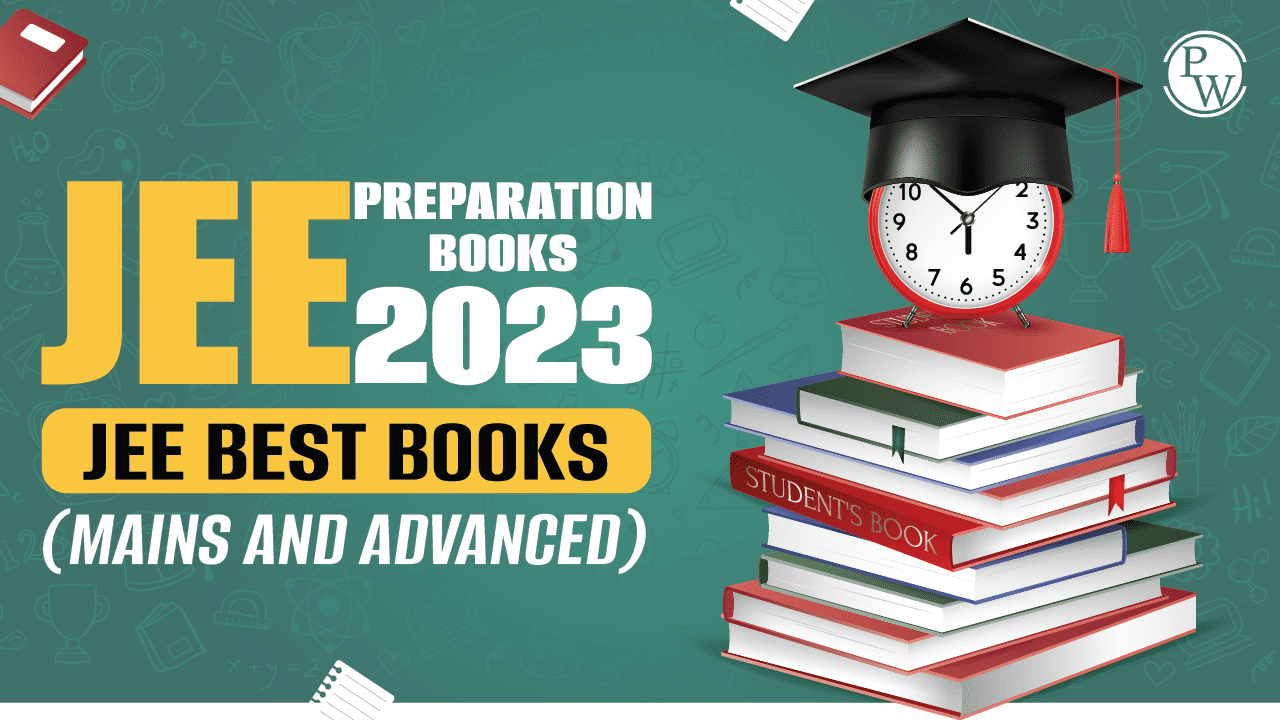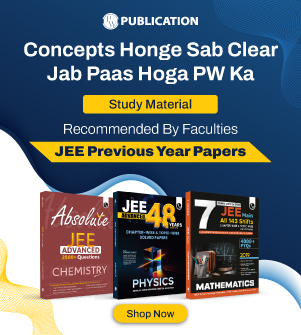JEE Preparation Books – JEE Books (Mains and Advanced)

JEE Preparation Books – JEE Books (Mains and Advanced)
Books for JEE preparation are revealed in this article. Students must start their preparation with these books to crack the exam!
Books for JEE preparation: Are you dreaming of a thriving engineering career? Do you aspire to excel in the field of engineering? If your answer is a resounding "yes," then the most effective route to realizing your dreams is embarking on the Joint Entrance Examination (JEE). JEE is the gateway for students to gain admission to some of India's most prestigious institutions, renowned for offering good engineering programs.
However, it's crucial to recognize that IIT JEE, in particular, stands as one of the most demanding and highly competitive entrance exams conducted across the nation. A glance at the statistics reveals that an overwhelming number of students vie for a coveted spot in this annual examination.
Are you a dedicated JEE aspirant poised to the challenges of this rigorous assessment? To achieve this feat, candidates must undertake a series of strategic steps. This journey demands a positive mindset, intelligent, diligent effort, unwavering dedication, and continual motivation.
Equally crucial is the wise selection of appropriate study materials. Many JEE preparation books have flooded the market; choosing the right one is akin to finding a precious pearl in the vast ocean. Nonetheless, the significance of selecting the right books must be considered. Premium study resources empower students to grasp subjects comprehensively rather than merely scratching the surface.
In light of these considerations, this article furnishes a comprehensive list of books to aid students in their quest to the JEE successfully. You'll find a curated selection of books tailored to specific subjects, which will serve as invaluable guides throughout your JEE preparation journey.
JEE Overview

Books for JEE Preparation
Difference Between JEE Main and JEE Advanced
The Joint Entrance Examination (JEE) is India's two-tier engineering entrance examination. It consists of two main components: JEE Main and JEE Advanced. Here are the critical differences between JEE Main and JEE Advanced:
Eligibility Criteria:
- JEE Main: JEE Main is the first level of the examination and is open to all students who have completed or are appearing for their 10+2 (or equivalent) examination. There are no specific eligibility criteria for age or the number of attempts.
- JEE Advanced: Only the top 2.5 lakh candidates from JEE Main are eligible to appear for JEE Advanced. Candidates must also meet a certain age and attempt limit criteria to be eligible.
Number of Papers:
- JEE Main: JEE Main has two papers: Paper 1 (for B.E./B.Tech) and Paper 2 (for B.Arch and B.Planning). Candidates can choose to appear for one or both papers, depending on the courses they are interested in.
- JEE Advanced: JEE Advanced consists of two papers, Paper 1 and Paper 2, both mandatory. The papers are designed to evaluate problem-solving skills and analytical abilities.
Examination Mode:
- JEE Main: JEE Main is conducted in both online (Computer-Based Test) and offline (Pen-and-Paper Test) modes, providing candidates with a choice.
- JEE Advanced: JEE Advanced is conducted in online mode only.
Difficulty Level:
- JEE Main: JEE Main is generally considered to have a moderate level of difficulty, with a focus on testing a candidate's understanding of basic concepts.
- JEE Advanced: JEE Advanced is significantly more challenging and is designed to assess candidates' problem-solving abilities and critical thinking. Questions are often of a higher difficulty level.
Number of Attempts:
- JEE Main: There is no limit to the number of attempts for JEE Main. Candidates can appear for it as many times as they wish.
- JEE Advanced: Candidates can attempt JEE Advanced a maximum of two times in two consecutive years, starting from the year they appear for their 10+2 examination.
Participating Institutes:
- JEE Main: The scores of JEE Main are used for admission to various top engineering colleges, including National Institutes of Technology (NITs), Indian Institutes of Information Technology (IIITs), and other state and private engineering colleges.
- JEE Advanced: JEE Advanced scores are used explicitly for admission to the Indian Institutes of Technology (IITs), among India's most prestigious engineering institutions.
Syllabus:
- JEE Main: The syllabus for JEE Main is based on the 10+2 curriculum of recognized central and state boards.
- JEE Advanced: The syllabus for JEE Advanced includes topics that go beyond the 10+2 curriculum. It is more extensive and includes additional topics.
Result Declaration:
- JEE Main: The results of JEE Main are usually declared within a few weeks of the examination.
- JEE Advanced: The results of JEE Advanced are typically announced a few weeks after the exam.
JEE Main serves as the initial screening test for engineering admissions, while JEE Advanced is the next level and is specifically for admission to the prestigious IITs. Candidates who qualify in JEE Main are eligible to appear for JEE Advanced.
Choosing Books for JEE Preparation Points to Remember
Selecting the books for JEE preparation in is a crucial decision that can significantly impact your performance in the examination. Here are some key points to remember when choosing the right books for your JEE preparations:
- Syllabus Compatibility: Ensure the books you choose align with the latest JEE syllabus. JEE syllabus evolves, so pick updated books that match the current curriculum.
- Standard Reference Books: Opt for renowned and widely used reference books. These books often cover the complete syllabus comprehensively and are trusted by toppers and educators.
- Author Credibility: Consider books authored by faculty and renowned educators. Books from respected authors are more reliable and comprehensive.
- Numerical Problems: JEE exams are known for their numerical problems. Look for books that offer a wide range of practice problems and examples to strengthen your problem-solving skills.
- Concept Clarity: The books you choose should explain concepts clearly and concisely. They should aid in building a solid foundation and understanding of the topics.
- Practice Papers: Books that provide previous years' question papers and mock tests can be beneficial. Solving these papers will give you an idea of the exam pattern and help you evaluate your progress.
- Additional Study Material: Some books contain supplementary materials like CD-ROMs, online resources, or mobile apps. These can enhance your learning quality.
- Student Feedback: Consult your peers, teachers, or online forums for recommendations. Learning from the experiences of others can help you make informed choices.
- Balanced Approach: Instead of relying on a single book for each subject, consider combining books to get a well-rounded understanding of the topics.
- Budget and Availability: Remember your budget constraints and the availability of the books. Some books can be expensive, so weigh the cost against their potential benefits.
- Online Resources: Utilize online resources, such as video lectures, digital study materials, and physical books. They can provide a more interactive learning quality.
- Time Management: Only spend a little bit of time selecting books. Once you've chosen, focus on effective and consistent study routines.
Remember that the books for JEE preparation can vary from student to student. Finding resources that align with your learning style and needs is essential. Regular practice, dedication, and a clear understanding of the concepts are equally, if not more, necessary than choosing books.
Remember that selecting the books for JEE preparation is just one aspect of your strategy. Effective time management, practice, and continuous improvement are equally crucial. Good luck!
Books for JEE Preparation FAQs
1) Is studying NCERT textbooks sufficient for JEE preparation?
While NCERT textbooks provide a good foundation, more than they might be required for in-depth JEE preparation, it's advisable to use additional reference books and practice materials to enhance your understanding and problem-solving skills.
2) Should I study all the books mentioned for each subject?
You can study some of the books listed for each subject. Select one or two books you find most comfortable and effective in understanding the topics and solving problems. It's more about quality than quantity.
3) Are there any specific books for JEE Advanced preparation?
Many books recommended for JEE Main are also suitable for JEE Advanced preparation. Books like "Problems in General Physics" and "Modern Approach to Chemical Calculations" can benefit advanced-level problem-solving.
4) How can I effectively use these books in my study routine?
Create a study schedule that allocates specific time for each subject and book. Start with NCERT textbooks and use the recommended reference books for deeper understanding and problem-solving practice. Regular revision is crucial.











